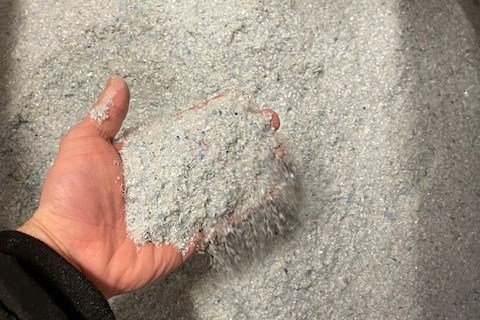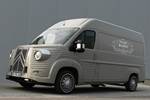Optiplan automotive sandwich panels optimized via AOC rPET resin series
Incorporation of AOC’s Synolite rPET resins into FRP cover sheets enables the development of more eco-friendly truck construction.

AOC rPET resin formulations made from post-consumer waste. Source | AOC
Opitplan GmbH (Oelsnitz, Germany) and AOC (Schaffhausen, Germany) have collaborated to develop Optiplan’s ultralight, high-strength, sustainable Polydet recycled PET (rPET) cover sheets for automotive applications, incorporating AOC’s formulations derived from post-consumer rPET waste.
Optiplan develops and manufacturers a broad variety of fiber-reinforced plastic (FRP) materials made via a continuous and discontinuous manufacturing process. The materials, typically glass fiber and a resin formulation in line customer specifications for the end-use application, are used for the production of sandwich panels incorporating a structural foam core. The resulting sandwich panels are broadly used for the manufacture of refrigerated trucks, motorhomes/caravans and various construction applications.
Recent work with a global truck manufacturer realized the development of a novel range of composite cover sheets under the company’s Polydet brand. The range, offering increased strength and stiffness, in addition to more increased sustainability, incorporates AOC’s Synolite 8421-N-1 formulation.
“Replacing continuous filament mat by fabrics has helped us to increase mechanical performance, while allowing the material to be thinner and lighter,” explains Felix Bönsch, managing director of Optiplan. “At the same time, the Polydet rPET product line is more sustainable, as they are made from AOC’s rPET products, which contain PET from post-consumer waste.”
“The AOC Synolite rPET resin series are made in our operations in Ústí nad Labem in the Czech Republic. In this plant we can convert a waste product into a valuable raw material, and ultimately, into a quality formulation,” says Fons Harbers, VP marketing and sales of AOC EMEA. “The manufacturing of formulations from post-consumer waste is more cumbersome in comparison with normal formulations, as it involves additional process steps. Yet, AOC does believe that using rPET as raw material will reduce the amount of plastic waste, and is the right thing to do for the environment.”
In order for customers to better recognize products with reduced environmental impact, AOC has introduced the Next Eco-label. Besides formulations with renewable content like rPET, the Next Eco-label also covers styrene-free, low styrene and bio-based series.
With positive results in hand, Optiplan’s customer asked it for an entire range of new lightweight truck designs. Benefits of the new trucks include reduced fuel consumption and extended action radius, while maintaining the advantage of low maintenance associated with the use of composites. “In addition, the increased payload and action radius, as well as the possibility to drive a greener car contribute to the positive driving experience,“ adds Timo Hoffmann, director of sales at Optiplan.
Beyond using Polydet r-PET for lightweight truck construction, Opitplan is confident its new product will find its way in motorhomes, caravans and last-mile delivery vehicles. Additionally, the eco-friendly features of these composite sheets position them for increased use in building and construction applications, with the most obvious end markets being modular housing, wet and cold storage rooms, building façades and surface cladding.
Related Content
-
Infinite Composites: Type V tanks for space, hydrogen, automotive and more
After a decade of proving its linerless, weight-saving composite tanks with NASA and more than 30 aerospace companies, this CryoSphere pioneer is scaling for growth in commercial space and sustainable transportation on Earth.
-
ASCEND program update: Designing next-gen, high-rate auto and aerospace composites
GKN Aerospace, McLaren Automotive and U.K.-based partners share goals and progress aiming at high-rate, Industry 4.0-enabled, sustainable materials and processes.
-
Materials & Processes: Composites fibers and resins
Compared to legacy materials like steel, aluminum, iron and titanium, composites are still coming of age, and only just now are being better understood by design and manufacturing engineers. However, composites’ physical properties — combined with unbeatable light weight — make them undeniably attractive.










.jpg;maxWidth=300;quality=90)


